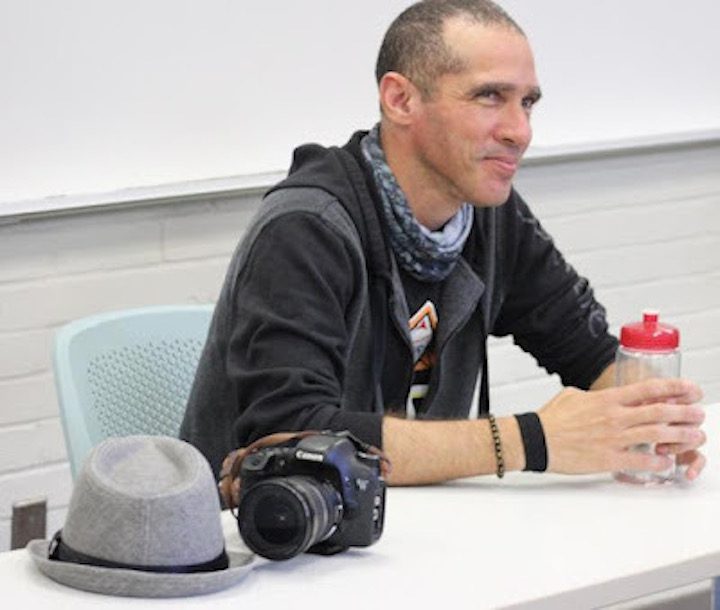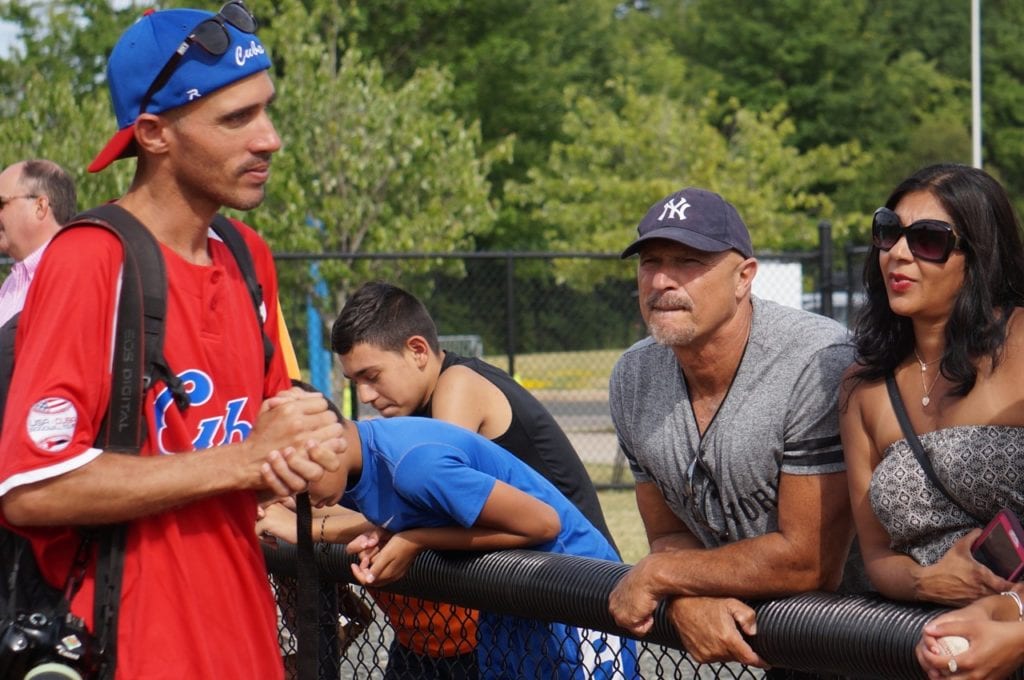Fleeing Repression, Cuban Journalist Finds Asylum, New Life in Connecticut

Audio By Carbonatix

Reynaldo talks about his career with students in a journalism class at the University of New Haven in December 2022. Photo credit: Erick Cuatzo (Courtesy photo)
Reynaldo Cruz, who first visited West Hartford in 2016 as part of a baseball exchange program and lived in town for more than a year, was granted political asylum last month.

Reynaldo Cruz Diaz chats with some Cuban-Americans who came to watch the game. USA-Cuba Goodwill Tour. University of Hartford. July 11, 2016. Photo credit: Ronni Newton (we-ha.com file photo)
By Francisco Uranga, CTExaminer.com
Reynaldo Cruz couldn’t sleep on a recent Monday night after learning that he had been granted political asylum in the United States. Nor the next day. It was not until Wednesday that he slept well and woke up for the first time in three years without fear of deportation.
Cruz, a photojournalist, fled Cuba after receiving a call on July 27, 2021 from his country’s intelligence services. Cruz, who refers to the services as “the political police,” said he was warned to be careful of what he posted on social media and on his baseball blog. He told CT Examiner it was not the first time he had been targeted for his criticism of the government.
“It was clear to me that I was being followed,” Cruz said. “When they arrest you for these things in Cuba, you don’t know when you’re gonna come out. You will not get a fair trial – if you ever go to trial. I took those things into account and I decided to leave.”
Just a few years ago, Cruz said he would not have thought of leaving Cuba. He worked for seven years, until 2017, at ¡Ahora!, a pro-government local newspaper. But everything changed quickly after the 2021 protests, given his critical views on the situation, his links to the U.S., and a government crackdown on political dissidents.
Forced to leave his wife and 5-year-old daughter in Cuba, the decision came at a high personal cost. Cruz has yet to see them again.
“I missed my daughter’s first day of school. I missed her losing her teeth and having her teeth grow again,” Cruz said. “I still communicate with her on video almost every day. That has helped, but sometimes it makes it harder.”
Cruz applied for a 180-day visa to Mexico and traveled there in August 2021. He told CT Examiner that his visa expired before he had received permission to travel to the U.S., but he decided to cross the border anyway without papers.
In the early morning hours of Jan. 22, 2022, he walked across the Rio Grande into Del Rio, Texas. Halfway across the river, the water at chest high, Cruz said he never knew it could be so cold in Texas.
Once on U.S. soil, he found a Texas National Guard Humvee, knocked on the glass and told the agents he was a Cuban asylum seeker. Cruz changed into dry clothes and was handed over to Border Patrol, which processed his case and moved him by van to a camp. Along the way, he said, they collected people in similar situations from Latin America and Africa.
Once there they were put in what he described as a cage.
“They treat you like criminals. There’s no other way to describe that,” Cruz said. “There were about 38 people in the first holding pod. We couldn’t even lie on the floor and sleep all at the same time.”
Cruz recounts in an affidavit he filed for asylum that he spent five days in two different detention camps in Del Rio and Valverde. He was then sent to T. Don Hutto Residential Center in Taylor, Texas, where he spent 13 days until released on Feb. 10.
To get out, he needed a plane ticket – so, Cruz called Tim Brennan, a friend who lives in West Hartford he had met because of a shared passion for baseball. Brennan bought the ticket and arranged housing. And for a year and a half, Cruz lived with Brennan’s mother in West Hartford.
Cruz and Brennan had met in 2016 through Teen Cultures Connect, a Connecticut-based organization founded by Brennan in 2016. The organization fostered sports and cultural exchanges between teens in the United States and Cuba. These were the years of political openness toward Cuba, when Barack Obama was president. Brennan said he saw baseball as an opportunity for closer ties.

Teen Cultures Connect at Yard Goats. Reynaldo Cruz is at far left. Photo credit: Ronni Newton
By then, Cruz was already a sports journalist of some repute in Cuba.
Six years earlier, he had created an independent online baseball magazine called Universo Béisbol in his hometown, Holguín, a city about 450 miles from the capital. It was quite a feat, according to Cruz, to launch that project in Cuba’s interior and at a time when internet access was more limited. But thanks to this work, he was invited to baseball conferences in the U.S. and he became a member of the Society for American Baseball Research, an organization dedicated to promoting the sport’s history.
Cruz was the only Cuban photographer allowed to take pictures during a baseball game attended by President Obama in Havana. Cruz’s camera recorded Obama in black glasses and a rolled-up shirt, smiling behind a light blue net and waving to the crowd that had come to watch the exhibition game between the Tampa Bay Rays and the Cuban National Team at Estadio Latinoamericano on March 22, 2016.
In 2016, Cruz was fundamental to organizing visits of American teens to Cuba and of Cubans to Connecticut. He not only helped with translation but also with visa arrangements for the young people who would be traveling.

Tim Brennan speaks as Reynaldo Cruz Diaz translates into Spanish. USA-Cuba Goodwill Tour. University of Hartford. July 11, 2016. Photo credit: Ronni Newton (we-ha.com file photo)
“He was our sort of guy on the ground in Cuba helping with some of those logistics,” Brennan said. “And we became close friends.”
The Teen Cultures Connect project continued until the COVID-19 pandemic and Brennan said he does not plan to resume it.
“When I learned more about what happened to Rey and I know how things are not going so well in Cuba, it lost the appeal to me,” Brennan said.
A lawyer but not an immigration specialist, Brennan also helped Cruz find a lawyer to handle his case.
Since the Cuban Adjustment Act was passed by Congress in 1966, Cubans generally have had a more direct path to legal residency than other immigrants. Under the law, any Cuban with temporary permission to stay in the U.S., who has lived in the country for a year and a day, can apply for a green card.
That was not the case for Cruz, who fled his country and entered the US illegally – but it was a situation that still could be remedied through political asylum.
Once granted asylum, the period of one year and one day until he could apply for permanent residency commenced.
Now Cruz can even hope for his family to move to the United States.
Ariel Ruiz Soto, senior policy analyst at the Migration Policy Institute, told CT Examiner that Cubans who enter without documents still have a higher asylum approval rate than people from other countries.
“Everyone has to prove they are persecuted for political reasons,” Ruiz Soto said. “Cubans usually have the evidence to prove they are persecuted by a communist government.”
Data from the Executive Office for Immigration Review show that 52% of asylum decisions were favorable for Cubans in fiscal year 2024, compared to 19% of Colombian applicants and less than 18% of Mexican applicants.
A good portion of cases end with decisions not granting legal residence but also not triggering deportation.
Ruiz also said that the length of cases has grown over time. What used to take six months if the asylum seeker had all the documents needed and a strong affidavit now takes more than two years.
“The number of federal immigration judges in the United States is much less than the cases we are seeing. Each judge has two or three hundred cases to decide,” Ruiz Soto said. “If you are a judge you don’t have a year to complete the cases that you have and rather every year you get more and they are accumulating.”
Last October, Cruz received a work permit.
“I started looking for jobs like a maniac. Sometimes rejection, sometimes not even a rejection,” Cruz said. “I looked for jobs as a dishwasher. I looked for all types of jobs to do.”
Finally, he got a job as a food runner at Restaurant Bricco in West Hartford.
He still works shifts in Bricco on weekends, but he got a job this year as a Spanish teacher at St. Paul Catholic High School in Bristol.
He had the advantage of being trilingual, speaking native Spanish, fluent English, and French. His English proficiency was born out of his baseball passion. As a child, his father gave him sports magazines to encourage reading and many were in English.
Cruz said that when he studied at university, he saw publications being thrown out of the library because they were in English. Among them was National Geographic. He told CT Examiner that he would read the magazines and dream of visiting and photographing small communities and little places that no one talked about. That led him to photography.
Now settled in Avon, and sharing an apartment with friends, Cruz said he imagines himself in a few years still teaching school. He doesn’t see himself returning to Cuba. But he said he would like to return to photojournalism. He still carries his camera wherever he goes and takes pictures mostly of Connecticut’s small businesses and blue collar workers.
“When you go and you photograph them in the work environment, people can see how hard working they are, how dedicated they are to their craft and how good they are at what they do,” Cruz said. “I believe that having a pictorial archive of human life is a way to keep history.”
Looking back, Cruz said he never doubted his decision to leave Cuba, despite the separation from his family, the difficulty crossing the border and the stress of applying for asylum. He called it an “eye-opening experience” that helped him better understand other migrants.
“You see that everybody out there is just like you. They have the same goals, the same dreams, the same struggles,” Cruz said. “I guess I’m not the only one who deserves a fair chance here.”
Editor’s Note: A version of this article by Francisco Uranga, ([email protected]) was originally published in CT Examiner on Sept. 24, 2024. Reprinted with permission.
Like what you see here? Click here to subscribe to We-Ha’s newsletter so you’ll always be in the know about what’s happening in West Hartford! Click the blue button below to become a supporter of We-Ha.com and our efforts to continue producing quality journalism.




I got to know Reynaldo in Cuba in 2019. He showed me the “good side” of Cuba but also showed me the REAL Cuba. I could see the struggles the cuban people has ti go thru every day just to survive.I am very happy to know that he has given a chance for a better future, I hope very soon he will be reunited with his family.